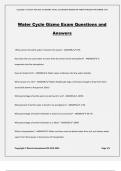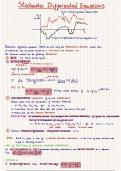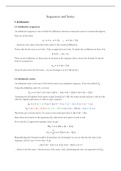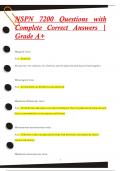, RSE4801 ASSIGNMENT 05
The issue of discipline in schools remains a critical aspect of educational research globally, as it directly
affects student performance, teacher retention, and the overall learning environment. This literature
review seeks to explore how the issue of discipline can be addressed in educational settings, drawing
from global, continental (Africa), and local (country-specific) literature. The primary objective of this
review is to examine the various factors contributing to disciplinary issues in schools and the possible
solutions that have been suggested across different contexts.
The scope of the review includes literature from various regions, with a focus on comparing the origins,
causes, effects, and solutions to discipline problems in schools. However, the review is limited by the
availability of recent literature and region-specific studies. The research questions guiding this review
are: (1) What are the common causes of disciplinary issues in schools globally, continentally, and locally?
(2) What solutions have been proposed in different contexts? (3) What gaps exist in the current
literature on school discipline
Discipline issues in schools are a global concern, and their causes, effects, and solutions have been
widely studied. Research shows that various factors contribute to these problems, including socio-
economic conditions, family background, and the school environment. These factors affect student
behavior, making discipline a complex issue to address. Over time, many schools have moved away from
harsh punishments like suspension toward more positive strategies such as restorative justice and
social-emotional learning (SEL). However, different approaches work better in certain contexts, and
there is no one-size-fits-all solution.
One of the main causes of discipline problems globally is socio-economic disparity. According to Smith
(2018), children from lower socio-economic backgrounds often face more stress outside of school, which
can lead to disruptive behavior in class. These students may be dealing with issues like poverty, food
insecurity, or unstable living conditions, all of which affect their ability to focus and behave in school.
When children are stressed, they may act out in ways that disrupt their learning and the learning of
others.
Family background also plays an important role. Brown and Jones (2019) found that children from
single-parent households or families going through divorce are more likely to have behavioral issues in
school. This may be because they lack stable support systems at home, which makes it harder for them
to cope with the demands of school. These children may feel emotionally overwhelmed, which can lead
to disruptive behavior in the classroom. The research suggests that both individual factors (like family
background) and environmental factors (like socio-economic status) combine to create discipline
problems in schools.
Discipline problems in schools can have a wide range of negative effects on both students and teachers.
One of the most documented effects is the impact on academic performance. A study by Johnson and
The issue of discipline in schools remains a critical aspect of educational research globally, as it directly
affects student performance, teacher retention, and the overall learning environment. This literature
review seeks to explore how the issue of discipline can be addressed in educational settings, drawing
from global, continental (Africa), and local (country-specific) literature. The primary objective of this
review is to examine the various factors contributing to disciplinary issues in schools and the possible
solutions that have been suggested across different contexts.
The scope of the review includes literature from various regions, with a focus on comparing the origins,
causes, effects, and solutions to discipline problems in schools. However, the review is limited by the
availability of recent literature and region-specific studies. The research questions guiding this review
are: (1) What are the common causes of disciplinary issues in schools globally, continentally, and locally?
(2) What solutions have been proposed in different contexts? (3) What gaps exist in the current
literature on school discipline
Discipline issues in schools are a global concern, and their causes, effects, and solutions have been
widely studied. Research shows that various factors contribute to these problems, including socio-
economic conditions, family background, and the school environment. These factors affect student
behavior, making discipline a complex issue to address. Over time, many schools have moved away from
harsh punishments like suspension toward more positive strategies such as restorative justice and
social-emotional learning (SEL). However, different approaches work better in certain contexts, and
there is no one-size-fits-all solution.
One of the main causes of discipline problems globally is socio-economic disparity. According to Smith
(2018), children from lower socio-economic backgrounds often face more stress outside of school, which
can lead to disruptive behavior in class. These students may be dealing with issues like poverty, food
insecurity, or unstable living conditions, all of which affect their ability to focus and behave in school.
When children are stressed, they may act out in ways that disrupt their learning and the learning of
others.
Family background also plays an important role. Brown and Jones (2019) found that children from
single-parent households or families going through divorce are more likely to have behavioral issues in
school. This may be because they lack stable support systems at home, which makes it harder for them
to cope with the demands of school. These children may feel emotionally overwhelmed, which can lead
to disruptive behavior in the classroom. The research suggests that both individual factors (like family
background) and environmental factors (like socio-economic status) combine to create discipline
problems in schools.
Discipline problems in schools can have a wide range of negative effects on both students and teachers.
One of the most documented effects is the impact on academic performance. A study by Johnson and










